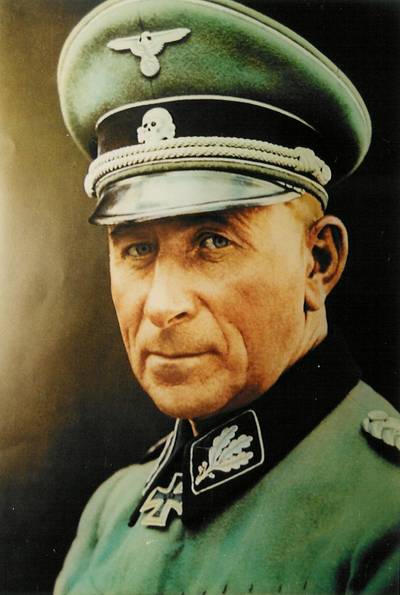











|


Paul Hausser Das Reich's First
Commanding Officer
The
2.SS first took part in the Campaigns in the West against the Low
Countries and France in 1940, and did so as the SS-V.T.-Division. It
first saw action in the main drive for Rotterdam. After Rotterdam the
Division, along with other Divisions, intercepted a French Force and
pushed them back to the area of Zeeland. Next, it was used to mop-up
small pockets of resistance in the areas already captured by the
Germans. The Division was then transfered to France and helped breach a
stiffly defended canal line, and then participated in the drive on
Paris. At the end of the Campaign, it had advanced all the way to the
Spanish Frontier.
Originally, the SS-V.T.-Division was composed of three of the original
four SS-Standarten. LAH was the other SS-Standarten, and it was
developed on its own. The other three SS-Standarten were Deutschland,
Germania and Der Fuhrer. After the Western Campaign was over, the SS-V.T.-Division
was reorganized. The SS-Standarten Germania was transfered out of the
Division and along with the SS-Standarten, Nordland and Westland, formed
the backbone of a different SS-Division, Germania, which was soon to
become the Wiking Division. For the loss of Germania, the SS-V.T.-Division
was given a SS-Totenkopfstandarte designated as SS-Infanterie Regiment
11. Soon after, the Division changed its title from V.T. to Deutschland,
and soon after that, to Reich.
During the period after the fall of France, the Division was stationed
in France preparing for the invasion of England. The Division, now
called Reich, was moved to Roumania to take part in the invasion of
Yugoslavia and Greece in March of 1941. In April, 1941, Reich took part
in the successful capture of Belgrade, the Capital of Yugoslavia. After
the capture of Belgrade, the Division was moved to Poland to take part
in the upcoming invasion of the Soviet Union.
During the invasion of the Soviet Union, Reich fought with Army Group
Center, taking part in the Battle of Yalnya near Smolensk, and then in
the spearhead to capture Moscow. Reich came within a few miles of the
Soviet Capital in November, 1941, reaching a sort of "High Water Mark"
of the Germanadvance in the Soviet Union. With the Soviet Capital within
sight of the Division, weather, massive losses and a major Soviet Winter
Counter-Offensive pushed the Division back. After a period of very
bloody losses for the Division, Reich was pulled out of the fighting and
sent to France to refit as a Panzer-Grenadier Division. Part of the
Division was left in the East, and they were titled Kampfgroup Ostendorf.
Ostendork was sent to join Reich on June, 1942.
In November, 1942, portions of the Division took part in an attempt to
prevent the scuttling of the French Fleet at Toulon. Soon after, the
Division was retitled again, this time to SS-Panzer-Grenadier-Division
"Das Reich".
Early in 1943, Das Reich was transferd back to the Eastern Front where
it helped reclaim the crumbling central front around Kharkov. After
helping recapture the city of Kharkov, Das Reich along with many other
Divisions was thrown into a massive assault into the Kursk Salient, a
huge bulge in the Soviet Front line around the area of Kursk. Das Reich
pushed upwards of 40 miles into the southern sector of the bulge, but
was pulled out of the battle along with the other SS-Division when the
offensive was called off. After a period of brief encounters, Das Reich
was refit once again, this time as SS-Panzer-Division "Das Reich". In
doing so, it left a portion the Division in the East titled Kampfgroup
Das Reich, and officially know as Kampfgroup Lammerding. The rest of the
Division was transferd to the West to refit, and while doing so also
took part in anti-partisan operations in France.
In Winter, 1943/1944, another massive Soviet Winter Counter Offensive
managed to encircle German units in the center of the front. The
Kamfgroup that Das Reich left behind was one of the units encircled by
the Soviet Offensive, and an assault by II. SS Panzer Korps managed to
rescue the trapped elements of Das Reich. The Kampfgroup was then
transfered to France to join the rest of the Division already station
there. The remaining small portion of Das Reich left in the East was
renamed Kampfgroup Weidinger and was envolved in the retreats through
Proskurow abd Tarnopol.
After the D-Day invasion in Normany, France, Das Reich was comitted to
stop the Allied advance, and took part in the many attempts to stop the
Allies near Caen and St. Lo. The Division recaptured Mortain, but was
forced to retreat when it became apparent the Allies were going to
encircle the Division along with a large number of other German units in
the Falises Pocket. Thanks to the efforts of Das Reich along with the
9th SS-Panzer Division, a large number of German were able to escape the
pocket and retreat to the east.
Pulled back across the Seine River and then to behind the West Wall
fortifications in France, the 2nd SS Panzer Division then took part in
the operations to punch through the Ardennes Forest in December, 1944.
Coming within sight of the River Meus, the Division was halted, and then
slowly smashed by fierce Allied counter-attacks. Pulled out of the
offensive, Das Reich was transfered into Germany to again refit, and
then to take part in the last German offenisve of the war in Hungary to
attempt to break the seige around Budapest. This offensive also ground
to a halt, and Das Reich spent the rest of the war more-or-less fighting
in parts from Dresden, to Prague to Vienna. In the end, most of the
Division managed to escape to the West to surrender to the Americans.
This info is from
www.feldgrau.com check out this page.

Game Sites 200 Banner Exchange
|